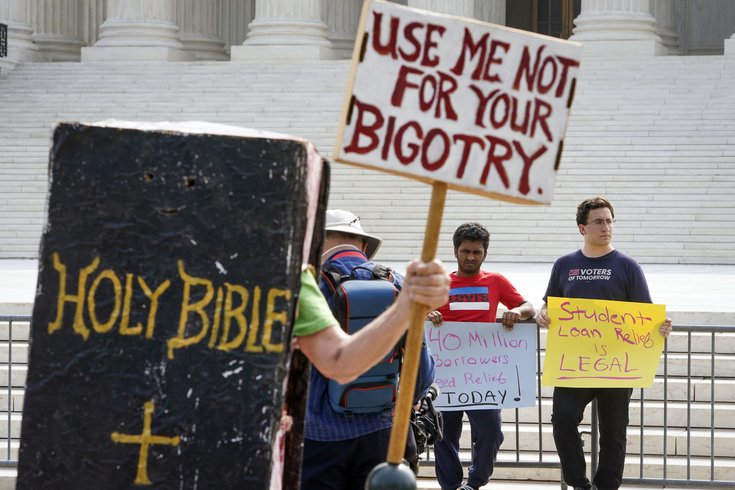
July 14, 2023
 Jack Gruber/USA Today
Jack Gruber/USA Today
A protester in a Bible costume with a sign against discrimination protests outside the U.S. Supreme Court building. The high court ruled that a website designer can discriminate against LBGTQIA couples requesting websites for their weddings
The conservative Supreme Court, led by Chief Justice John Roberts, ruled in favor of 303 Creative – a suit brought by Lorie Smith. The court held that a website designer can discriminate against LBGTQIA couples that request websites for their weddings. Ironically, Smith doesn't yet have a business for making wedding websites nor have any queer people requested a wedding website from her. She simply was arguing that it was within her free speech rights to publicly state that she would never make websites for queer couples.
Smith, who is a conservative Christian, felt that if she were one day to make a website for queer people, she would be violating her free speech rights. She knew that Colorado's anti-discrimination law made such discrimination illegal, so she came to the court, without "injury"– mind you – to see if she could be forced to make such a website. The court ruled in her favor, 6 to 3. The case and the ruling have many flaws. For example, the ruling does not have a limiting principle, and thus can be broadly applied. Also, the court exercised judicial overreach and offered an advisory opinion. Many commentators have suggested it opens the doors for all kinds of discrimination against all kinds of people.
MORE: New HBO docuseries revisits 1990s serial killings of gay men from Philly and N.Y.
The issue for me – a pastor of a Mennonite church in Philadelphia – is that Christians have heralded it as a win for themselves and for pluralism. However, this sort of political action on the part of Christians is antithetical to the gospel, regardless of their views on LGBTQIA people. Instead of sacrificing their own freedoms for the sake of others, these conservative Christians are putting vulnerable people in harm's way, even other minorities that they purportedly support.
Some have commented that the court's ruling protects the free speech of all – those who support and those who oppose LGBTQ+ rights. There is false equivalency here. Just because the Supreme Court equates the rights of queer people and those who oppress them does not mean that Christians should. Unfortunately, too many moderate Christians can't tell the difference between minorities asking for basic rights and dignity from the state and white Christian nationalists working to amass more power.
The call from Jesus is for self-denial. Christians should deny their own pursuit of power in favor of elevating those who suffer. Furthermore, they should construct their own theology around this idea. That is the cruciform witness: to sacrifice ourselves for the most vulnerable, modeling the same sacrificial love that Jesus did for us. Jesus welcomed and saved even the stranger, the immigrant and the other. God's alliance with the oppressed is pronounced in scripture, and as followers of God, ours must be too.
We need to be able to distinguish between what it means to lift up another person and to elevate ourselves. The Supreme Court failed to make this distinction, and sadly, Christians celebrated as a result. But rather than celebrate, Christians should mourn the hostility and oppression against the most vulnerable. We need to be able to tell the difference between when we serve those with power and when we serve those without power. We need to be able to distinguish between inclusion and discrimination, or, to say it plainly, between love and hate.
Protecting the rights of queer people is fundamentally different from protecting the rights of those who oppress them. In one case, we are dealing with persons – their humanity, and their dignity. And in the other case, we are dealing with someone's ideas about those people. The Supreme Court and far too many Christians can't seem to make that distinction, which can only lead to further dehumanization of queer people.
In the Sermon on the Mount, Jesus says, "If any wish to come after me, let them deny themselves and take up their cross and follow me. For those who want to save their life will lose it, and those who lose their life for my sake will find it. For what will it profit them if they gain the whole world but forfeit their life? Or what will they give in return for their life?"
We must deny ourselves in order to serve others. The calling from Jesus requires us to consider who the vulnerable are, who the least of these among us are, and who the little sheep are. Jesus calls us to advocate for them. Our doctrine and theology must be rooted, at its core, in service of the most vulnerable.
Lorie Smith chose to affirm her own beliefs and to seek protection for her "right" to discriminate. She chose to deny Christ, instead of denying herself. And in celebrating the decision, as a coup for free speech and for pluralism, those Christians have lost a central tenet of the gospel. They've tried to gain the whole world, but have forfeited their souls. They've caused LBGTQIA folks, what Jesus calls the "little ones," to stumble, and the judgment they've incurred will be heavier than a millstone hung around their neck. May God have mercy on them, and may God's grace lead to their transformation.
Jonny Rashid is the pastor for West Philadelphia Mennonite Fellowship and author of "Jesus Takes A Side." He is an abolitionist and a housing activist. He is an avid cook, who blogs at jonnyrashid.com. He studied journalism, education and history at Temple University and completed his masters of divinity at Palmer Theological Seminary.